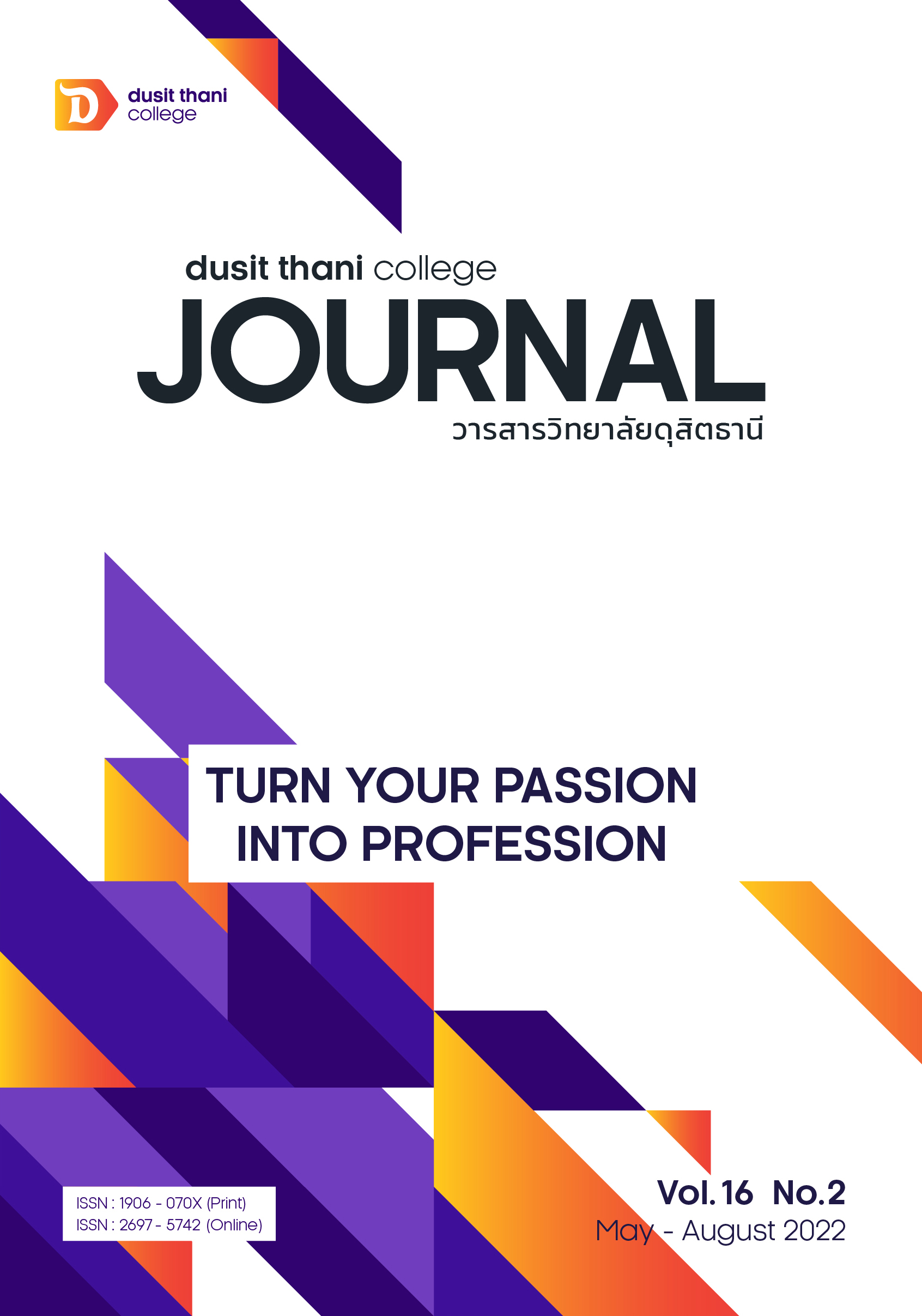The Demand for Careers in the Hospitality and Tourism Industry of People Entering the Labor Market after the Epidemic of COVID-19
Main Article Content
Abstract
The research aims were 1) to study the demand for careers in the hospitality and tourism industry of people entering the labor market after the epidemic of Covid-19 and 2) the comparison of demands for career in the hospitality and tourism industry of people entering the labor market after the epidemic of Covid-19 by their personal factors. The sample consists of 400 students who are studying in 3rd and 4th year of the tertiary institutions of the lower central region higher education research network. The questionnaire was used to collect data via Google Form. The statistics used for data analysis were frequency, percentage, mean, standard deviation, t-test and One-way ANOVA. The results showed that the overall demand for careers in the hospitality and tourism industry of people entering the labor market after the COVID-19 was at a high level of demand ( = 4.48, SD = 0.140). Moreover, considering each aspect in descending order, it was found that the aspect with the highest mean was the job security and life ( = 4.62, SD = 0.393), followed by the work environment ( = 4.50, SD = 0.204). The lowest mean for demand for careers was the relationship between people ( = 4.39, SD = 0.256). For the comparison of the demand for career in the hospitality and tourism industry among people entering the labor market after the Covid-19 situation classified by personal factors, we found that the different level of educational outcomes of people entering the labor market will results in the different demand for careers in the hospitality and tourism industry after the epidemic of COVID-19. Other than that, there were no statistically significant differences at the .05 level.
Article Details

This work is licensed under a Creative Commons Attribution-NonCommercial-NoDerivatives 4.0 International License.
Article Screening Policy
- All research and academic articles to be published must be considered and screened by three peer reviews in the relevant field / article.
- All articles, texts, illustrations and tables published in the journal are the personal opinions of the authors. Editors don't always have to agree. And no responsibility whatsoever is the sole responsibility of the author.
- The articles to be published must never be published. Where did you first publish? And not in the consideration of other journals If the audit found that there has been a duplicate publication It is the sole responsibility of the author.
- Any article that the reader sees as being plagiarized or impersonated without reference. Or mislead the work of the author Please let the journal editor know it will be your greatest blessing.
References
Banpato, P. (2019). Factors Affecting Decision-Making on Working in the Service Industry of Bachelor’s Degree Students Majoring in Hotel Management Studying in Bangkok and Suburban Areas. Master of Arts in Hospitality and Tourism Industry Management. Bangkok University.
Benjarongkrit, Y. (1999). Audience Analysis. Bangkok: T.P.Print Co.,Ltd.
Bruttos, N and Suekitinun, W. (2015). Decision Making for Career Selection, Motivation, and Advancement in Pretty MC Career. RMUTT Global Business and Economics Review. Vol.10 No. 1 (June 2015). page 121 – 132.
Chimkaew, T. (2019). Motivation Factors Influencing to Career Decision Making Process of Undergraduate Students in Ramkhamhaeng University. Master of Business Administration in Management. Ramkhamhaeng University.
Duangpakdee, A. (2007). Factors Influencing the Choice of Occupation of the Unemployed In Accordance with Social Security Act of B.E. 2533 in Bangkok Metropolitan, Region 1. Master of Labour and Welfare Development, Faculty of Social Administration, Thammasat University.
KaewKred, T. (2017). Career Decision Making of Private Enterprise Employees in Nakhon Pathom Province. Master of Business Administration. Bangkok University.
Koul, L. (1984). Methodology of Educational Research. New Delhi: Vani Education Book.
Ministry of Tourism and Sports. (2021). The Tourism Situation in Thailand and the Impact of COVID-19 on Thai Tourism. (online). Available: http://secretary.mots.go.th/2021/09/10.
Ministry of Tourism and Sports. (2019). Tourism Statistics. (online). Available: http://secretary.mots.go.th/2021/09/16.
Peanmunkung, N. (2016). The Factors Influence in Choosing of Student’s Career in Field of Aviation Management, Institute of Aviation Technology, Rajamangala University of Technology Tawan – Ok, Bangphra Campus. The 7th Hatyai National and International Conference on June 13, 2016 at Hatyai University. page 24 – 38.
Sereerat, S. (2011). Consumer Behavior. Bangkok: WisitPhattana Co.,Ltd.
Silpakorn University Research, Innovation and Creativity Administration Office. (2021). Research Network for Higher Education in Lower Central Region of Thailand. (online). Available: http://www.thaiwest.su.ac.th/2021/10/9.
Suwannaphong, K. (2017). The Effects of Career Attitudes and Quality of Work Life on Service Performance of the Thai Airways International Public Company Limited’s Flight Attendants. Master of Science Program in Human Resource and Organization Development, the Graduate School of Human Resource Development, National Institute of Development Administration (NIDA).
Tourism Authority of Thailand. (2017). Internal Tourism Situation. (online). Available: http://kasikornresearch.com/th/2021/05/15.
Waisriseang, J. (2009). Factors Affecting Decision Making of Undergraduate Students in Public and Private University on Occupation Selection in Bangkok. Master of Arts in Social Development, the Graduate School of Social and Environmental Development .National Institute of Development Administration (NIDA)
Yih, C.M. (1992). A study of job satisfaction in Taiwan. Pennsylvania: The Pennsylvania State University.


